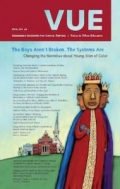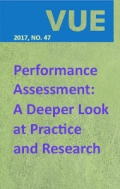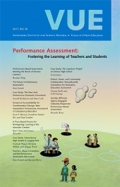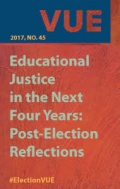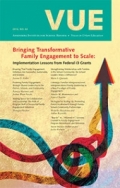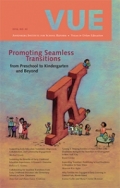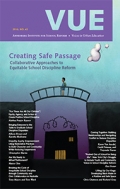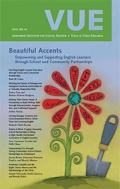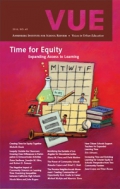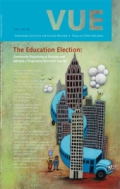VUE issues
Scholars and practitioners in school districts around the country are collaborating to build an asset-based counter-narrative about young men of color and develop evidence-based strategies to better serve them. However, these change agents do not always have a chance to work with their peers in other districts to collectively challenge structural racism.
This issue of Voices in Urban Education builds on a 2017 conference, sponsored by the American Educational Research Association (AERA) and organized by NYU and AISR, that aimed to address this need. Researchers and practitioners from seven sites gathered in New York City to share system-level strategies that challenged deficit mindsets and implicit bias, nurtured healthy and respectful relationships, and developed culturally sustaining practices. In this VUE issue, you will read some of their stories.
This issue is an online supplement to VUE 46, which addressed the topic of performance assessment – a personalized and rigorous alternative to standardized testing that allows teachers to build on individual students’ strengths and foster more equitable learning outcomes.
VUE 47 adds additional current materials, offers opportunities for additional voices, and provides more examples of performance assessment. Because performance assessment is an active national conversation, the work continues; following VUE 46’s publication, important national conferences and other milestones occurred that we’re able to share here. This issue also provides perspectives from students, educators, researchers, and policymakers.
Against a backdrop of the opportunities provided by the Every Student Succeeds Act (ESSA) and the challenges for education posed by the new federal administration, this issue of VUE proposes performance assessment as a personalized and rigorous alternative to standardized testing. Performance assessment provides an opportunity for educators in public schools and districts to more equitably meet the needs of students through the use of more relevant, engaging curriculum and instruction that prepares students for complex problem-solving and collaboration.
This special post-election, online-only issue of VUE features interviews with a wide range of thought leaders in the field of educational justice – including practitioners, policy and foundation leaders, youth and adult activists, and academic researchers – reflecting on what lies ahead in the aftermath of the 2016 election.
What lessons can we learn from i3 grants about how to build the right conditions for family engagement initiatives to flourish? The authors in this issue – program directors and coordinators, district administrators, evaluators, and youth leaders, representing rural and urban communities across the country – draw on their own experiences to reveal the critical elements of successful, sustainable, and scalable family engagement programs.
This issue of VUE explores the transition from pre-K to kindergarten and beyond, highlighting the importance of systems alignment, collaboration, and community engagement.
Efforts to address school discipline disparities throughout the country are being led by a broad range of stakeholders – including community organizers, nonprofits, advocates, district leaders, teachers’ unions, researchers, funders, legislators, and other groups. Bringing these stakeholders together to examine identity-based disparities, exclusionary policies, and punitive practices – and to work collaboratively toward designing interventions – has the great potential to create positive and healthy school climates where all students can find “safe passage” from early childhood to young adulthood.
Community partners help schools and districts empower and engage a broad range of children often narrowly labeled as “English learners” – newcomers, refugees, immigrants, and children of immigrants – to support their learning and development in culturally responsive ways that go far beyond language acquisition.
In urban communities across the nation, a broad range of partners have committed to reinventing educational time together to ensure equitable access to rich learning opportunities for all young people.
How did community organizations and residents create an equity-driven education agenda and transform the public debate in the 2013 New York City mayoral campaign? The authors in this issue of VUE share the stories of the community organizations that made that happen.
- 1 of 5
- next ›

